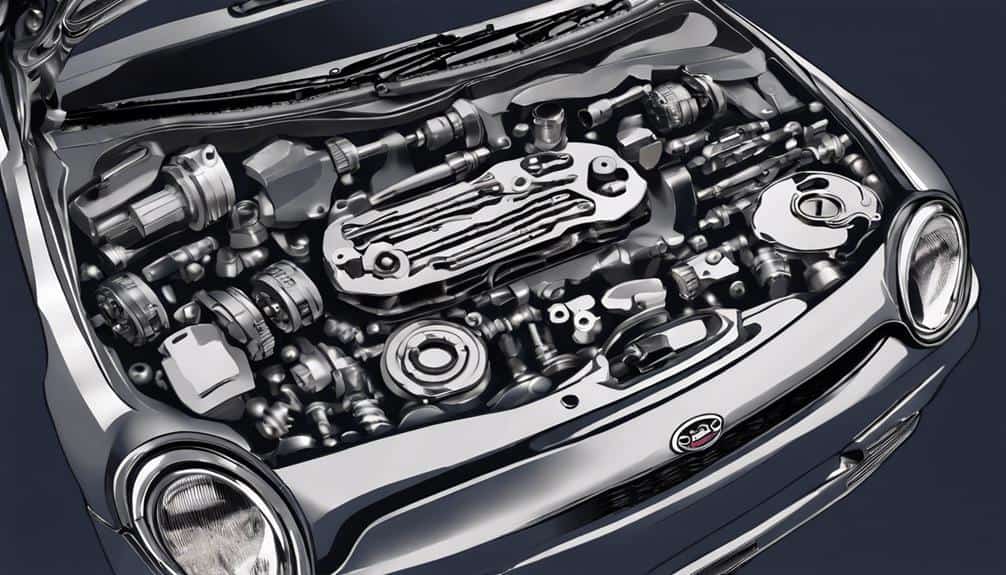For peak performance, consider replacing the timing chain on your Mini Cooper around 100,000 miles. Various factors like wear and maintenance affect its longevity, so listen for unusual sounds like whining or ticking noises that could indicate potential issues. Taking proactive measures and following manufacturer guidelines can prevent costly repairs and guarantee top engine operation. Swiftly addressing any signs of timing chain problems is essential to avoid engine damage. Staying proactive in maintenance and addressing issues promptly will keep your Mini Cooper running smoothly.
Mileage Recommendation
When considering the mileage recommendation for replacing the timing chain in a Mini Cooper, it's generally advised to aim for replacement around 100,000 miles. While timing chains in Mini Coopers are designed to be essential parts, factors such as wear and tear, lack of proper maintenance, or driving conditions can influence their longevity.
Regular maintenance, including timely oil changes, can greatly extend the lifespan of the timing chain. However, it's vital to inspect the chain closely once the 100,000-mile mark is reached to guarantee performance.
Adhering to manufacturer guidelines for maintenance intervals is paramount in preserving the timing chain's integrity. Neglecting routine maintenance may lead to premature wear of the timing chain, potentially resulting in costly repairs. By staying proactive and replacing the timing chain around the recommended mileage, Mini Cooper owners can maintain the efficiency and reliability of their vehicle's engine.
Unusual Sounds Detection
When listening for unusual sounds in your Mini Cooper's engine, be attentive to any rattling, clattering, grinding, or whining noises that may signal timing chain issues.
Utilize your diagnostic skills to identify irregular ticking or clicking sounds that could indicate potential problems with the timing chain.
Promptly investigate any sudden changes in engine sound, such as metallic rattling or slapping, to guarantee early detection and address timing chain concerns efficiently.
Noise Identification
If you hear rattling or clanking noises when starting your Mini Cooper or accelerating, it could indicate timing chain issues. These noises are often more pronounced during cold starts or when you press on the gas pedal. To identify timing chain problems, listen for distinct metallic sounds emanating from the engine bay. Ignoring these noises can result in significant engine damage, leading to costly repairs. It is crucial to address any unusual sounds promptly by consulting a mechanic to prevent further complications.
| Noises to Listen For | Possible Cause |
|---|---|
| Rattling during start-up | Timing chain wear |
| Metallic clanking | Timing chain tensioner issues |
| Whining sounds | Timing chain guide problems |
| Ticking noise at idle | Timing chain stretching |
Diagnostic Tools
To pinpoint the source of unusual engine noises related to the timing chain, utilize diagnostic tools such as stethoscopes or mechanic's listening devices. These tools are essential in identifying the specific sounds that may indicate timing chain issues in Mini Coopers. When unusual sounds like rattling or clanking are detected, it's imperative to seek professional diagnosis promptly.
Advanced diagnostic tools like engine stethoscopes enable mechanics to precisely locate the problem within the timing chain system. By incorporating these diagnostic tools into the evaluation process, early detection of timing chain issues becomes possible, allowing for timely and effective repairs to be carried out. Trusting in the capabilities of these tools can lead to a more accurate assessment of the timing chain's condition and ensure peak engine performance.
Maintenance Impact on Timing Chain
Regular maintenance practices greatly impact the longevity and performance of the timing chain in Mini Coopers. To guarantee the timing chain in your Mini Cooper remains in peak condition, follow these maintenance tips:
- Timely Oil Changes: Regular oil changes are essential for the health of the timing chain. Dirty oil can accelerate wear on the chain components, leading to potential timing chain issues.
- Timing Chain Inspection: It's advisable to have the timing chain inspected around the 100,000-mile mark. This proactive approach can help identify any signs of wear or issues early on.
- Filter Replacements: Changing oil filters, cabin filters, and air filters as part of regular maintenance tasks contributes to the longevity of the timing chain. Clean filters help maintain a healthy engine environment, reducing stress on the timing chain.
- Listen for Warning Signs: Stay attentive to any unusual sounds like rattling or clicking noises coming from the engine. These can be indicators of potential timing chain problems that may require immediate attention.
Timing Chain Failures in MINI Cooper S
Timing chain failures in MINI Cooper S models have been a recurring issue that demands timely attention and proactive maintenance practices. Regular oil changes are vital in preventing premature wear on the timing chain of your Mini Cooper S. Neglecting oil changes can lead to increased friction and wear on the chain, potentially causing it to fail. If you notice any unusual sounds like rattling or ticking coming from the engine, it could be a sign of impending timing chain problems. Addressing these issues promptly is essential to prevent more severe damage and costly repairs in your Mini Cooper S.
When faced with suspected timing chain problems in your Mini Cooper S, it's highly advisable to consult a professional mechanic. A trained mechanic will have the expertise and tools necessary to diagnose and address timing chain issues accurately. Taking swift action and seeking professional help can save you from significant repair bills down the line. Trusting the expertise of a mechanic specialized in Mini Cooper S vehicles ensures that your timing chain concerns are handled effectively.
Signs of Timing Chain Issues
If you notice a rattling sound while driving your Mini Cooper, it could indicate a loose timing chain.
Engine misfires and poor performance may also point to timing chain issues in your vehicle.
Be attentive to any signs of engine stalling, as this could be a result of a worn-out or broken timing chain.
Noise While Driving
When driving your Mini Cooper, a distinct rattling noise may indicate potential timing chain issues that require immediate attention to prevent engine damage. Here are some key points regarding the noise while driving:
- Noticeable Sound: The rattle noise may become more pronounced during acceleration or while idling.
- Warning Sign: Ignoring the noise can result in significant damage to the engine over time.
- Prompt Inspection: If you detect any unusual sounds emanating from your Mini Cooper, it's advisable to have the timing chain inspected promptly.
- Preventive Action: Addressing timing chain issues early on can help avoid costly repairs and safeguard the longevity of your vehicle.
Engine Misfires
Considering the symptoms of engine misfires in your Mini Cooper, an essential indicator of potential timing chain issues is irregular combustion affecting performance. Engine misfires, often caused by timing chain problems, disrupt the synchronization of engine components, leading to poor combustion within the cylinders.
These misfires can result in decreased engine performance and efficiency. Ignoring these misfires may exacerbate the timing chain issues, causing further damage to the engine. To prevent costly repairs, it's important to address engine misfires promptly.
If you notice your Mini Cooper experiencing frequent misfires, it's advisable to have the timing chain system inspected by a professional to diagnose and resolve any underlying problems before they escalate.
Poor Performance
Experiencing rough engine performance and power loss during acceleration could indicate underlying timing chain issues in your Mini Cooper. When your Mini Cooper shows signs of poor performance, it's essential to address potential timing chain problems promptly. Here are some key indicators to watch out for:
- Rough Engine Operation: If your engine runs unevenly or feels shaky, it could be due to timing chain issues.
- Loss of Power During Acceleration: A noticeable decrease in power when you press on the gas pedal might signal a timing chain problem.
- Engine Backfiring: Unusual sounds like backfiring could be a result of timing chain issues affecting engine timing.
- Check Engine Light Illumination: When the check engine light comes on, it's vital to conduct diagnostics to determine if timing chain problems are the cause.
Importance of Prompt Addressing
Addressing timing chain issues promptly is essential to prevent engine damage and guarantee peak performance in Mini Coopers. The timing chain plays a critical role in synchronizing the engine's components, and any delay in addressing issues can result in serious damage to the engine.
Ignoring signs of timing chain wear such as rattling noises or engine misfires can lead to costly repairs down the line. Timely replacement of the timing chain is crucial to ensure peak engine performance and avoid unexpected breakdowns.
Regular maintenance and inspections by experienced technicians are key to catching timing chain problems early on. Trusting skilled professionals for timing chain replacements in Mini Coopers is vital for maintaining the longevity and reliability of your vehicle.
Professional Mechanic Evaluation
To accurately determine the need for timing chain replacement in your Mini Cooper, a professional mechanic evaluation is essential. When seeking a professional evaluation for your Mini Cooper's timing chain, here's what you can anticipate:
- Comprehensive Inspection: A trained mechanic will conduct a thorough examination of the timing chain to assess its condition, wear patterns, and any potential issues.
- Utilization of Diagnostic Tools: Modern diagnostic tools will be used to measure chain stretch and alignment, providing precise data to determine if replacement is necessary.
- Expert Analysis: With specialized knowledge and experience, the mechanic can identify early signs of timing chain wear or damage that may not be obvious to an untrained eye.
- Timely Replacement Guidance: Relying on a professional evaluation ensures timely replacement when needed, preventing more severe damage and costly repairs down the line.
Preventative Maintenance Benefits
Regularly replacing the timing chain in your Mini Cooper is vital for preventing engine damage and guaranteeing peak performance and longevity. The timing chain plays an essential role in synchronizing the engine's components, and over time, it can wear out, leading to potential catastrophic engine failures.
Engaging in preventative maintenance by adhering to the manufacturer's recommended schedule for timing chain replacement can help you avoid costly repairs and keep your Mini Cooper running smoothly. By proactively replacing the timing chain before it fails, you not only protect your engine from damage but also ensure top performance.
Neglecting this maintenance task could result in severe consequences, such as bent valves or even complete engine failure. Investing in preventative maintenance for your Mini Cooper's timing chain is a wise decision that will benefit both your vehicle's longevity and your wallet in the long run.
Conclusion
You have learned about the importance of timing chain replacement in MINI Coopers.
Remember, ignoring signs of timing chain issues can lead to costly repairs and potential engine damage.
Consult a professional mechanic for a thorough evaluation and preventative maintenance plan.
Don't wait until it's too late – stay ahead of potential timing chain failures to keep your MINI Cooper running smoothly and efficiently.


